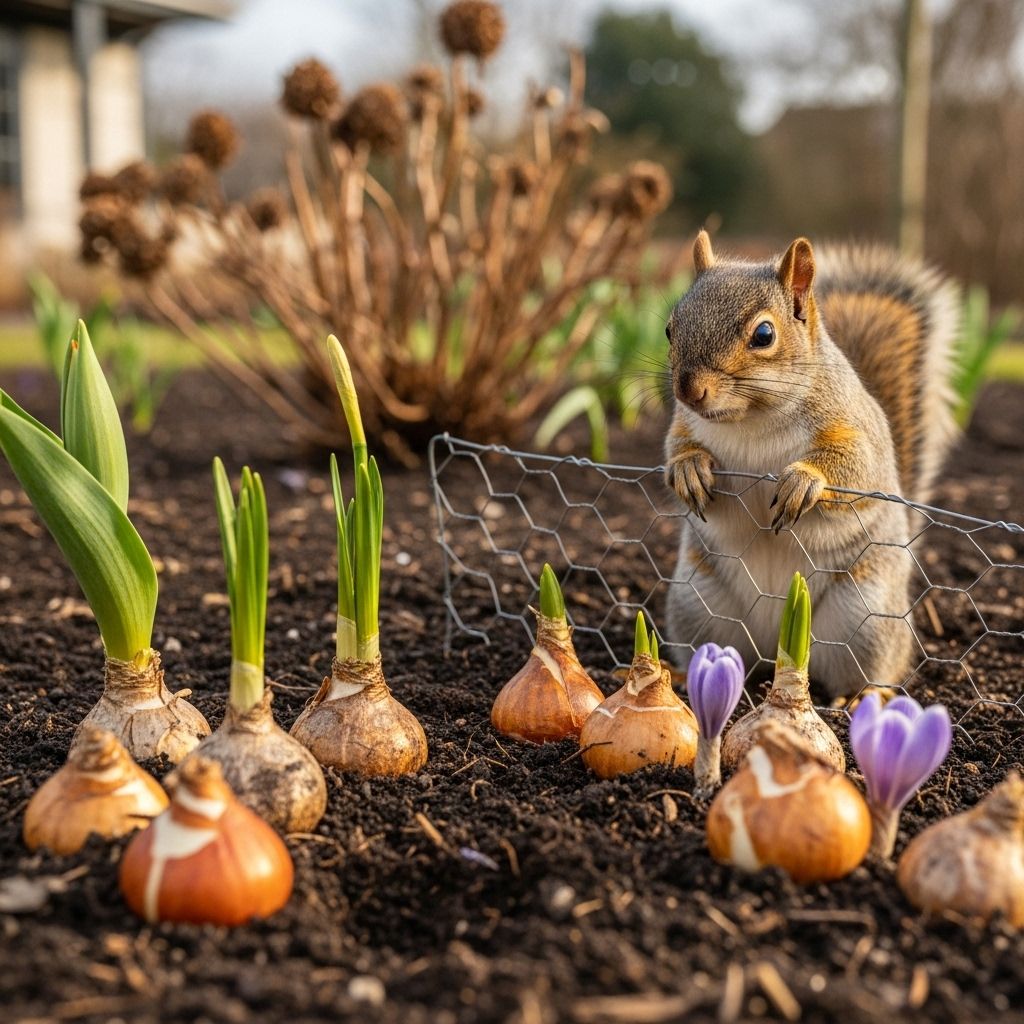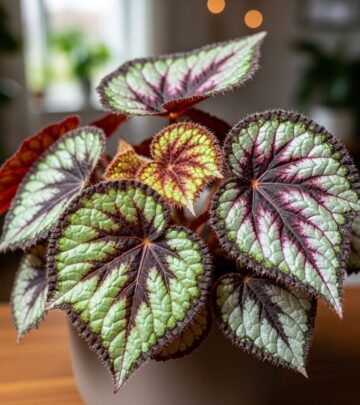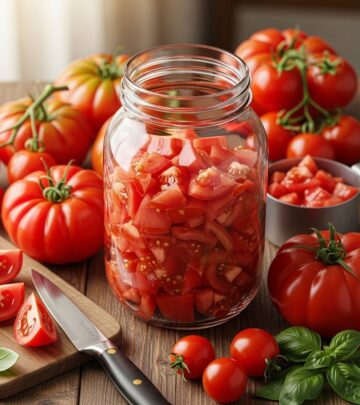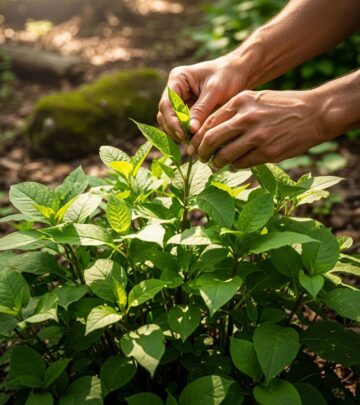Protect Bulbs From Squirrels: Expert Garden Tips
Discover proven strategies and expert tips to prevent squirrels from feasting on your garden bulbs, ensuring a beautiful spring display.

Image: HearthJunction Design Team
How to Protect Garden Bulbs from Hungry Squirrels
Every autumn and spring, gardeners eagerly anticipate vibrant displays of tulips, crocuses, hyacinths, and other blooming bulbs. Yet, as soon as those bulbs are tucked into the ground, hungry squirrels and other critters often arrive, eager to feast on your hard work. Fortunately, there are a variety of effective strategies and products that can help keep your bulbs safe—ensuring you enjoy a glorious garden come spring.
Why Do Squirrels Dig Up Bulbs?
Squirrels are naturally curious, opportunistic foragers with a keen sense of smell. Freshly dug soil and newly planted bulbs often attract their attention, as they search for food to store for winter. Some bulbs, like tulips and crocus, are particularly appealing as a food source, while others are less palatable due to their taste or toxicity.
- Squirrels can detect freshly disturbed soil, often associating it with buried food such as nuts, seeds, or bulbs.
- Certain bulbs offer the high-calorie nutrition squirrels seek before winter.
- These animals are persistent and surprisingly clever when seeking food.
Bulbs Squirrels Love (and Those They Avoid)
Not all bulbs are equally attractive to squirrels and similar pests. Knowing which bulbs are more at risk—and which are naturally avoided—can help guide your planting strategy.
- Most Vulnerable Bulbs: Tulips and crocuses are among squirrels’ favorite snacks. They often dig up and eat these bulbs, sometimes destroying entire plantings overnight.
- Less Appealing Bulbs: Daffodils (Narcissus), alliums (ornamental onions), hyacinths, fritillarias (crown imperials), muscari (grape hyacinths), and scilla (Siberian squill) are far less palatable or even toxic to squirrels and other rodents.
These less-attractive bulbs are not only more likely to survive the winter unscathed—they also tend to multiply and naturalize over time, offering years of beauty with less hassle.
Physical Barriers: The First Line of Defense
Physical deterrents are among the most reliable ways to stop squirrels from accessing your bulbs. There are several tried-and-true methods:
Use Chicken Wire or Hardware Cloth
- After planting bulbs, lay a sheet of chicken wire or hardware cloth (with mesh openings of about 1 inch) flat over your planting area. Secure the edges with landscape pins or stones and cover with soil or mulch to hide it.
- This barrier prevents squirrels from digging while still allowing bulbs to sprout and grow through the openings.
- For maximum protection, line the planting hole with chicken wire, create a “cage” for the bulbs, and then cover with another layer on top before filling in with soil.
Thorny Prunings and Natural Barricades
- Place thorny branches, such as rose bush prunings, holly sprigs, or raspberry canes, in a crisscross pattern over the soil above your bulbs. Their prickly texture creates an uncomfortable barrier for digging squirrels.
- Remove these natural deterrents only when bulbs begin actively growing in spring and are no longer vulnerable.
Protect Bulbs in Pots
- For bulbs planted in containers, top the soil with chicken wire or a strong netting until shoots appear.
- If practical, grow bulbs in pots until just before flowering, then transplant them into the garden—minimizing exposure to foraging rodents.
Natural and Commercial Squirrel Deterrents
Besides barriers, there are several substances and products known to discourage squirrels from digging up bulbs.
Natural Repellents
- Strong Scents: Pepper flakes, coffee grounds, and commercial deer/squirrel repellents can repel squirrels due to their potent odor and taste.
- Crown Imperials: Planting Fritillaria imperialis (crown imperials) alongside vulnerable bulbs can help, as their strong smell is highly unpleasant to squirrels (and, unfortunately, to some people as well).
- Holly Sprigs: Forage for holly or similar sharp-leaved branches and stick them into pots or beds for a natural, sustainable deterrent.
Commercial Repellents
- A variety of squirrel repellents are available, many offering pet- and plant-safe solutions. Look for granular or spray versions labeled for squirrels, using as directed around your plantings.
- Products such as Plantskydd have been reported effective for various rodents, lasting for several months per application and safe for use around children and pets.
Smart Planting Practices to Outsmart Squirrels
In addition to physical and chemical deterrents, a few changes to your planting routine can help reduce losses to squirrels:
- Plant Gently: Squirrels are attracted to freshly disturbed soil. Minimize soil disturbance and tamp down the surface after planting. Add an inch of mulch to hide evidence of digging.
- Don’t Dig Up Old Bulbs: Leaving soil undisturbed in established bulb beds keeps bulbs hidden and reduces squirrel interest.
- Timing Matters: Plant bulbs later in the season, once squirrels are less active, if you live in a region with a mild winter.
- Use Companions: Mix less tasty bulbs (like daffodils or alliums) with favorite snacks such as tulips, making the area less appealing overall.
Best Bulb Choices for Squirrel-Prone Gardens
If squirrels are a persistent problem, consider focusing your garden on bulbs they reliably avoid. Here are some of the best options:
| Bulb | Description | Squirrel Appeal |
|---|---|---|
| Daffodils (Narcissus) | Bright spring flowers, naturalize easily | Very Low |
| Alliums | Ornamental onions, distinctive globes | Very Low |
| Muscari (Grape Hyacinth) | Blue or purple spikes, multiplies fast | Low |
| Hyacinthoides (Bluebells) | Shade-loving, woodland beauty | Low |
| Fritillaria (Crown Imperials) | Tall, dramatic blooms, strong scent | Very Low |
| Scilla (Siberian Squill) | Hardy, bright blue carpets | Low |
| Nectaroscordum (Honey Garlic) | Unique bell-shaped flowers | Low |
Frequently Asked Questions (FAQs)
Q: What is the most effective way to keep squirrels from digging up bulbs?
A: The most effective method is to physically prevent access using chicken wire or hardware cloth over the planting area. Combining barriers with deterrents and strategic planting provides the best results.
Q: Are there any bulbs that squirrels will definitely not eat?
A: While especially persistent squirrels may try anything, daffodils, alliums, fritillaria, hyacinths, and muscari are rarely touched due to their toxicity or unpalatable taste.
Q: Can I use pet hair or human hair to deter squirrels?
A: Some gardeners report limited success with sprinkling pet hair or human hair over planting beds, as the scent may repel squirrels. However, this method is less reliable than physical barriers or commercial repellents.
Q: Do repellents harm the squirrels or the bulbs?
A: Most commercial repellents are formulated to be non-toxic to animals, plants, and humans. Always use according to the product’s instructions for safety and effectiveness.
Q: Can I plant bulbs deeper to prevent squirrel damage?
A: Planting bulbs deeper (at the recommended depth for each species) can make digging more difficult for squirrels, but the most determined ones may still reach them. It’s best used in combination with other deterrents.
Summary and Final Tips
- Squirrels are persistent, attracted to certain bulbs, and can decimate plantings if left unchecked.
- Use physical barriers like chicken wire or thorny branches for reliable protection.
- Opt for bulbs squirrels dislike, such as daffodils, alliums, muscari, and fritillaria, for low-maintenance beauty.
- Incorporate natural and commercial repellents as a second line of defense.
- Plant gently, minimize soil disturbance, and mix varieties for best results.
With the right combination of smart planting, squirrel-resistant bulbs, and a few tried-and-tested deterrents, you can look forward to a colorful, squirrel-free spring garden.
References
- https://www.gardendesign.com/advice/squirrels-bulbs.html
- https://www.gardensillustrated.com/garden-advice/how-to/stop-squirrels-eating-tulips
- https://www.countryliving.com/uk/homes-interiors/gardens/a64295139/monty-don-keep-bulbs-safe-squirrels/
- https://www.longfield-gardens.com/article/how-to-protect-fall-bulbs-from-chipmunks-and-squirrels
- https://gardenbite.com/you-dig-in-bulbs-squirrels-dig-them-out/
Read full bio of Srija Burman












